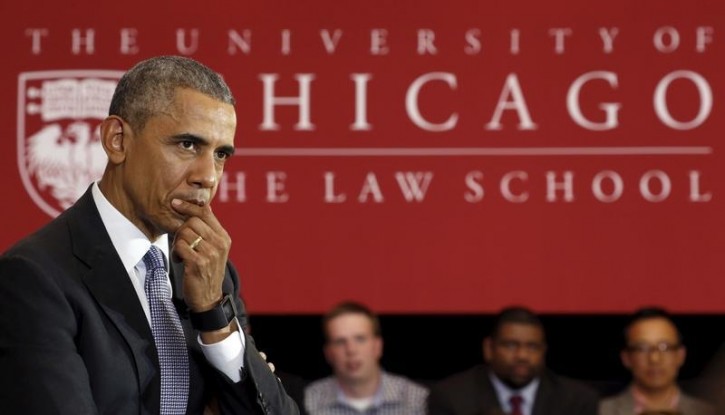
Chicago, IL – President Barack Obama on Thursday defended his pick of a white man to fill a U.S. Supreme Court vacancy against criticism he could have chosen someone from a more diverse background, saying Merrick Garland was “indisputably qualified” for the post.
Obama was speaking at a town hall-style event at the University of Chicago Law School, where he once taught, as part of a White House campaign to pressure the Republican-led Senate to approve Garland, a centrist appellate court judge.
Responding to a question from a student about what kind of “diversity” Garland brought to the job, Obama joked that he came from Skokie, Illinois, a suburb of Chicago.
“At no point did I say: ‘Oh, I need a black lesbian from Skokie in that slot … can you find me one?’ That’s just not how I’ve approached it,” Obama said, noting he had transformed the federal court with diverse picks.
“Yeah, he’s a white guy, but he’s a really outstanding jurist. Sorry,” Obama said of Garland, 63, calling him “indisputably qualified to serve on the highest court in the land.”
Obama’s first two Supreme Court picks were women, including Sonia Sotomayor, the court’s first Hispanic justice. Some groups had hoped Obama would this time nominate appeals court judge Sri Srinivasan to be the court’s first Indian-American member.
Garland faces an uphill fight being confirmed in the face of Republican opposition.
Senate Majority Leader Mitch McConnell has insisted the next president, who will take office on Jan. 20 after the Nov. 8 election, should fill the vacancy created by the Feb. 13 death of conservative Justice Antonin Scalia.
Before the event, McConnell dismissed Obama’s Chicago event as political theater.
“I’m sure he’ll gloss over the fact that the decision about filling this pivotal seat could impact our country for decades, that it could dramatically affect our most cherished constitutional rights like those contained in the First and Second Amendments,” McConnell said in a Senate floor speech, referring to gun rights and freedom of speech and religion.
The high court is now split 4-4 between conservatives and liberals. Garland, if confirmed, could tilt the court to the left for the first time in decades.
‘INSTITUTIONAL INTEGRITY’
Obama told the law school audience that the partisan fight over the nomination threatened to erode the “institutional integrity” of the courts.
“We are going to see the kinds of sharp partisan polarization that have come to characterize our electoral politics seeping entirely into the judicial system, and the courts will be just an extension of our legislatures and our elections and our politics,” Obama said.
“At that point, people lose confidence in the ability of the courts to fairly adjudicate cases and controversies,” he said.
Most Republican senators have backed McConnell’s stance. Only two of the 54 Republicans in the 100-seat Senate have said Garland deserves hearings and a vote.
Some others have said they will meet with Garland privately for a “courtesy visit.” That includes Judiciary Committee Chairman Chuck Grassley, who is set to have breakfast with Garland next Tuesday, but only to explain why he will not consider his nomination.
On Thursday, Senator Lindsey Graham, a South Carolina Republican, announced he would have a courtesy meeting with Garland. But Graham’s spokesman said the senator had not changed his opposition to holding hearings and a vote on the nomination.
As reported by Vos Iz Neias
